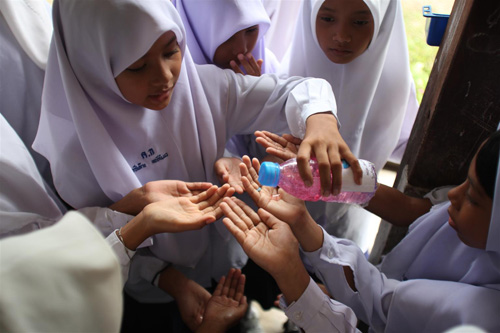
“我们已经到了一个重要的目标, 但我们不能停在这里. 我们下一步必须是针对最难以达到, 最贫穷和最弱势的人群在世界各地. The United Nations General Assembly has recognized drinking water and sanitation as human rights. That means we must ensure every person has access.” — 潘基文, 联合国秘书长.
世界水日三月 22 is a day on which all global citizens should focus their attention on the importance of fresh water to sustainable development. Earlier this month the UNICEF/WHO Joint Monitoring Report, 对饮用水和卫生设施的进展 2012, 宣布全球已经达到了千年发展目标 (千年发展目标) target of halving the proportion of people without access to safe drinking water. Despite this achievement, 确保每一个孩子的水权, 卫生, 和卫生教育仍然是政策制定者的一大挑战, school administrators and communities in many countries. What are the major challenges and obstacles that must be overcome? 这是社区最危险? 什么样的教育项目,目前到位并正在取得的进步是什么? What can each of us as global citizens in classrooms around the world that have safe drinking water and sanitation do to help classrooms that do not? I had the pleasure of discussing this among other things with Susan Durston, 副主任, 教育计划和教育的全球首席联合国儿童基金会.
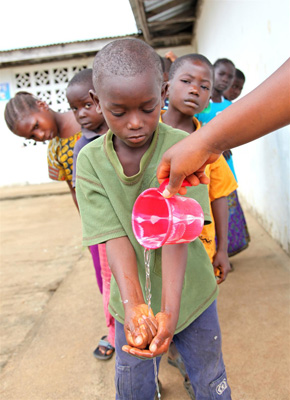
世界上哪个社区今天仍然是安全饮用水的主要目标?
的 36 不在轨道上的国家实现千年发展目标的全球水目标, 三分之二都在撒哈拉以南非洲地区. 有许多口袋在其他地区也正在落后. 联合国儿童基金会及其合作伙伴正在加强努力,帮助这些国家成功地满足饮用水的目标 2015 或此后不久,.
联合国儿童基金会十分关注成千上万的儿童无法获得改善水源. 在一些国家已经取得了良好的进展, 最穷的人几乎没有获益. 注意力必须集中在最贫穷的人,以确保他们获得这些服务, 和不公平,必须通过有针对性的干预措施,以达到这些被抛在后面加以解决.
地区之间的差距, 国家, 农村和城市地区, 妇女和女童, 和家庭收入揭示当今一些需要注意的关键事项.
什么教育计划有UNICEF放的地方在学校帮助孩子了解水的情况下在其特定的区域,他们可以做些什么?
UNICEF, through its water and sanitation programs in schools (WASH), works towards making schools healthier and more attractive to children. 健康的儿童更有效的学习者, and girls who spend less time fetching water have more time for school.
UNICEF and partners are funding WASH in Schools activities in 94 国家, including initiatives in some of the most difficult situations for children.
The Essential Health Care Program (EHCP), implemented by the Philippines’ 教育系, is an outstanding example of large-scale action to promote children’s health and education.
Three group activities – washing hands daily with soap, brushing teeth daily with fluoride toothpaste, and deworming twice a year – are the core of this nationwide program. The purpose is to lower rates of diarrhea, respiratory infections, worm infections and severe tooth decay. The program has scaled up rapidly, currently reaching about 2 万儿童.
It has also generated strong evidence to indicate that after just one year, rates of oral infection, malnutrition and worm infections were significantly reduced among children in participating schools.
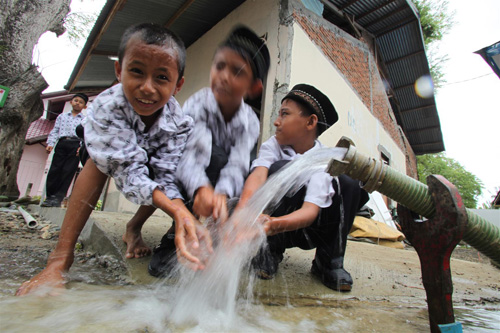
What obstacles does UNICEF face in providing an education where needed most?
Access to water and sanitation affects children’s right to education in many ways, and lack of these facilities in schools can have a detrimental effect on children. It can lead to intestinal worms which research shows, saps a child’s learning ability, affects their food intake, and can lead to diarrheal diseases that may cause children to lose school days. 从本质上说, this impacts their learning, leading to children not being able to catch up classes, and can eventually lead to children dropping out of school all together. This is particularly true for girls, who with no water or private toilets may miss 25% of classes every month.
The biggest challenge in children’s education today is inequity in access to school and the quality of education. 除其他事项外, 教育可以打破贫穷和匮乏的代际循环, 创造更多的教育机会, and promote gender equality.
例如, more than half the world’s primary age out-of-school children live in 15 国家. In Nigeria: A poor, rural Hausa girl completes only 0.3 years of education; a wealthier or urban boy completes 10.3 年.
UNICEF’s Education Program is working towards sharpening the focus on the “公平” in education through multiple strategies and initiatives, by paying particular attention to excluded and marginalized children. At the global level, they include tools for planning such as bottleneck analysis, the Out-of-School Children Initiative, and advocates for Child Friendly Schools that address social norms including sanitation practices. Research on social norms and teachers provides data for better planning. 同样, education programs across countries and regions are working to address specific issues as they get played out within the regional, national and sub-national contexts to further promote and support equity. Education colleagues work with social protection and other sectors to address the barriers children face in access to good quality education.
What are the main challenges you are facing in relation to WASH in Schools in these communities?
The lack of quality data on WASH in Schools coverage is a significant barrier to identifying children’s needs, establishing and carrying out effective programs, and monitoring progress. Because many countries have not defined their minimum standards for WASH in Schools, and the monitoring systems do not reflect WASH in Schools as an indicator, the quality of data on coverage and access remains questionable. It is common, 例如, that a national monitoring system thinks it’s adequate to report that a school with 300 孩子, which has just one latrine hole, has sufficient access to sanitation.
Lack of clear guidelines and policies is yet another challenge and can have an added disadvantage on children with disabilities. Unhygienic sanitation affects all children, and disabled children even more. An analysis of surveys from 14 developing countries finds that children with disabilities, 年龄 6-17, are much less likely to have enrolled in school or be in school than their peers. Research shows, accessible WASH facilities are key to their attendance in school. Conflicts — both natural and man-made — can sometimes go as far as to undo WASH practices so carefully taught and instituted in schools. Sustainability and maintenance of facilities is another challenge. Many schools do not have funds to buy soap and keep it at hand washing stands and also repair and maintain toilets and water supply facilities.
Schools are often the focal points for a community’s water supply. UNICEF has supported and continues to support programs that focus on water and sanitation in the school, thereby strengthening the role of the community and access to safe water for the whole community as well.
因此,, renewed commitments are needed to 1) set minimum standards for WASH in Schools by adopting standards based on UNICEF-World Health Organization guidelines, 和 2) to monitor WASH in Schools coverage through education management information systems (EMIS) and support the compilation of data on coverage and practices at the global level.
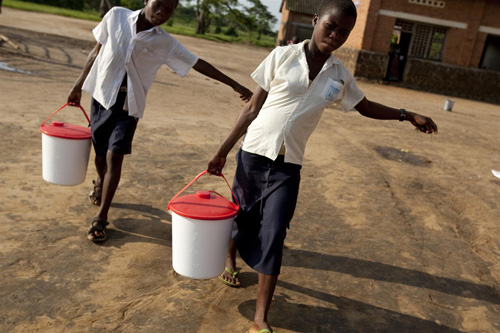
While volunteering in Tanzania I noticed that women and girls were responsible for domestic water supply and sanitation. What is being done to elevate the position of women so that they may support the development of their communities better?
UNICEF especially believes in girls’ 教育 (主, secondary and tertiary). Educating girls is not only the right thing to do but it is an investment in our collective future. Communities and governments are also recognizing this. Girls equipped with a quality education are more empowered and better prepared to protect themselves against violence and exploitation and are also less vulnerable to disease, including HIV and AIDS.
When water is not available on premises, including domestic use, women and girls are much more likely to be the main water carriers for families. This is a great concern because it takes up time when they should be in school or enjoying their childhood.
Bringing water sources closer to home will cut the time spent in water collection and help cleanliness in the home.
A WASH in Schools evaluation in Kenya indicates that girls were absent less in schools where there was more hand washing and very high toilet use. In Bangladesh and India, innovative projects demonstrate that menstrual hygiene can be incorporated into broader WASH in Schools interventions. Training and information for peer groups of children and female teachers show how women and girls can be empowered through improved menstrual hygiene management.
Starting today and every day going forward, what can classrooms around the world that have safe drinking water do to help the classrooms around the world that do not?
Engage with WASH in Schools programs, by contributing to the bigger picture and bringing individual or small-scale projects into cooperative initiatives that reach more schools, more effectively.
Schools can buddy with each other in advocating and sharing knowledge about healthy water and sanitary practices. 反过来, children can carry this message to the wider community. Schools or classrooms can also raise funds to help students without water and hygiene sources to also have access to these basic facilities.
We have proof of the impact of WASH in Schools and we all have a role to play to ensure its success. Every child deserves to be in a school that provides safe water, 卫生, and hygiene education. 毕竟, it is their right.
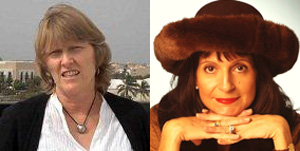
All photos courtesy of UNICEF.
在全球寻找教育, 和我一样,全球知名的思想领袖,包括迈克尔·巴伯爵士 (英国), 何. 迈克尔座 (美国), 何. 莱昂特司特因 (美国), 何. 琳达·达林 - 哈蒙德 (美国), 何. 马达夫查万 (印度), 迈克尔·富兰教授 (加拿大), 霍华德·加德纳教授 (美国), 伊冯娜赫尔曼教授 (荷兰), 克里斯汀Helstad教授 (挪威), 让·亨德里克森 (美国), 玫瑰Hipkins教授 (新西兰), 科妮莉亚Hoogland教授 (加拿大), 太太. 尚塔尔考夫曼 (比利时), 何. Eija Kauppinen (芬兰), 多米尼克·拉方丹教授 (比利时), 休·劳德教授 (英国), 本·莱文教授 (加拿大), 巴里McGaw教授 (澳大利亚), 希夫纳达尔 (印度), Ř教授. 纳塔拉詹 (印度), 何. 丹尼斯教皇 (美国), 斯瑞达拉贾戈帕兰 (印度), 何. 黛安·拉维奇 (美国), 肯·罗宾逊爵士 (英国), 帕西SAHLBERG教授 (芬兰), 安德烈亚斯·施莱歇 (PISA, 经合组织), 何. 安东尼·塞尔顿 (英国), 何. 大卫·谢弗 (美国), 何. 基尔斯滕都沉浸式 (挪威), 总理斯蒂芬·SPAHN (美国), 伊夫Theze (公立中学美语), 查尔斯Ungerleider教授 (加拿大), 托尼·瓦格纳教授 (美国), 大卫·沃森爵士 (英国), 迪伦Wiliam教授 (英国), 何. 马克沃莫尔德 (英国), 西奥Wubbels教授 (荷兰), 迈克尔·杨教授 (英国), 和张民选教授 (中国) 因为他们探索所有国家今天面临的大画面的教育问题. 全球搜索教育社区页面
ç. M. 鲁宾是两个广为传诵的在线系列,她接受了笔者 2011 厄普顿·辛克莱奖, “全球搜索教育” 和 “我们将如何阅读?” 她也是三本畅销书, 其中 真正的爱丽丝梦游仙境.


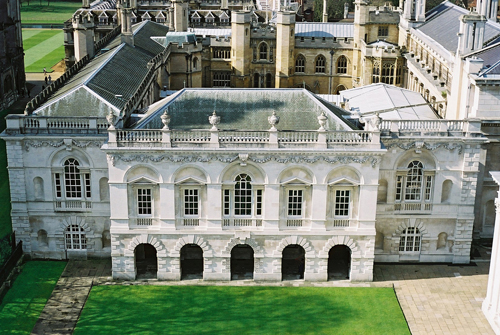

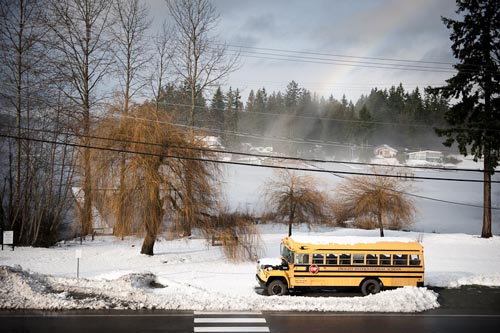
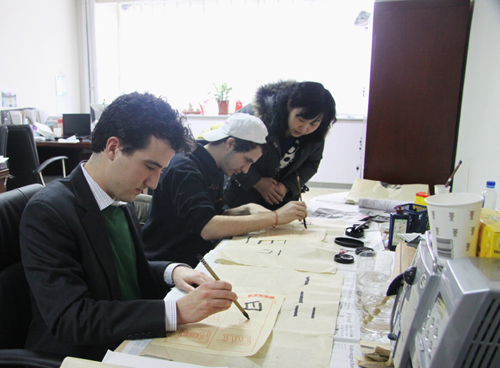
最新评论